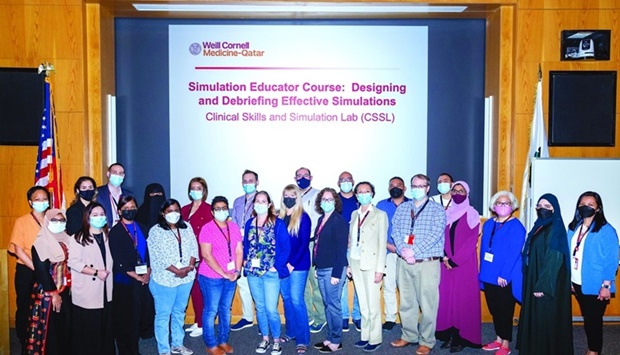WCM-Q launched its inaugural course on designing and debriefing effective simulations drawing upon the updated Healthcare Simulation Standards of Best Practice.
The course directors were Dr Stella Major, associate professor of family medicine in clinical medicine, Joshua Vognsen, simulation education specialist at WCM-Q, and Prof Michelle Brown, associate professor and director of the healthcare simulation graduate programme at the University of Alabama. The directors were awardees of a competitive CPD (continuing professional development) grant in 2021 to develop and deliver a CPD activity in 2022.
Since 2017, WCM-Q’s division of medical education has supported the college’s Clinical Skills and Simulation Lab team, to host a simulation-based symposium. The symposium is directed by Dr Major and supported by members of the Qatar Simulation Consortium. Dr Major believes that this new simulation instructor course is a key milestone in the progress made by the team to further support the promotion of best practice in simulation-based education for practitioners in Qatar.
Twenty-two participants attended this two-day course, of whom seven were MDs and 15 allied health professionals and educators employed at various institutions in Qatar. The course explained the theoretical foundations of healthcare simulation and demonstrated how to design simulated scenarios that will be effective learning tools. The course also described techniques for post-session debriefing in ways that engage learners, promote reflection, and mitigate frustration. After the techniques had been described, the participants applied the theoretical knowledge in guided practical sessions.
Dr Major said: “We worked hard to develop a course which would be both interactive and provide participants with useful resources and cognitive aids that they could take back to their home institutions and immediately apply in practice.”
Vognsen noted: “Often, healthcare providers can receive their training in silos. One of the highlights of this course was challenging an interprofessional group of educators to design effective interprofessional simulations for their learners.”
Participants’ learning was evaluated for knowledge by a pre-post survey, with a positive change in respondents’ knowledge across all the domains. Additionally, one participant wrote: “Probably the best educational session I’ve ever attended, I was engaged the entire time. I was stimulated - lots of practical application. I implemented some of the positive feedback techniques with my students the next day and was delighted to discover it worked!”
The course directors were Dr Stella Major, associate professor of family medicine in clinical medicine, Joshua Vognsen, simulation education specialist at WCM-Q, and Prof Michelle Brown, associate professor and director of the healthcare simulation graduate programme at the University of Alabama. The directors were awardees of a competitive CPD (continuing professional development) grant in 2021 to develop and deliver a CPD activity in 2022.
Since 2017, WCM-Q’s division of medical education has supported the college’s Clinical Skills and Simulation Lab team, to host a simulation-based symposium. The symposium is directed by Dr Major and supported by members of the Qatar Simulation Consortium. Dr Major believes that this new simulation instructor course is a key milestone in the progress made by the team to further support the promotion of best practice in simulation-based education for practitioners in Qatar.
Twenty-two participants attended this two-day course, of whom seven were MDs and 15 allied health professionals and educators employed at various institutions in Qatar. The course explained the theoretical foundations of healthcare simulation and demonstrated how to design simulated scenarios that will be effective learning tools. The course also described techniques for post-session debriefing in ways that engage learners, promote reflection, and mitigate frustration. After the techniques had been described, the participants applied the theoretical knowledge in guided practical sessions.
Dr Major said: “We worked hard to develop a course which would be both interactive and provide participants with useful resources and cognitive aids that they could take back to their home institutions and immediately apply in practice.”
Vognsen noted: “Often, healthcare providers can receive their training in silos. One of the highlights of this course was challenging an interprofessional group of educators to design effective interprofessional simulations for their learners.”
Participants’ learning was evaluated for knowledge by a pre-post survey, with a positive change in respondents’ knowledge across all the domains. Additionally, one participant wrote: “Probably the best educational session I’ve ever attended, I was engaged the entire time. I was stimulated - lots of practical application. I implemented some of the positive feedback techniques with my students the next day and was delighted to discover it worked!”

